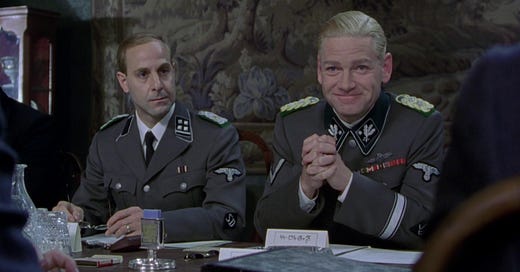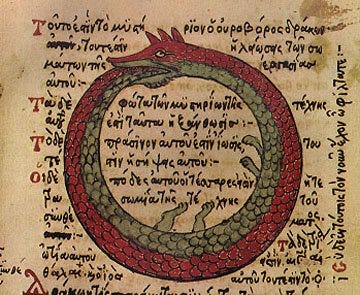Once Upon a Holocaust: Crossing the Threshold of Cognitive Warfare
Stories We Tell Ourselves, or Stories We Are Ourselves, Part Three
The storyteller awoke from a dream he could not remember, and lay awake. A thought kept running through his mind, like a half-waking dream. The thought was amorphous, and he struggled to bring it into words, in order to put it to rest.
What about the stories I don’t know that I am telling, or telling without meaning to tell? What if I am caught inside a story that is telling me: telling me to tell it to others?
In the essay form, there are three classic stages: thesis, antithesis, and synthesis. Every story has a protagonist, an antagonist, and a crisis-resolution. Every myth is circular as well as linear. It is an Ouroboros that eats itself and shits itself out anew.
Keep this in mind as we proceed.
Cognitive Warfare
Cognitive warfare: “The explicit targeting of human cognition—how people perceive and interpret information to gain knowledge and understanding. The use of psychology and advanced technologies to target individuals or groups precisely. [D]isruptive ICT [information communication technology] has made identifying thousands—even millions—of specific individuals, analyzing their behaviors and traits, and targeting their cognition possible.” —“Cognitive Warfare: Maneuvering in the Human Dimension,” by Majors Andrew MacDonald and Ryan Ratcliffe, U.S. Marine Corps, April 2023
That so many today harbor, as I have, the deep-felt certainty that we have been lied to, from birth onward—that we are haunted by the sense that few, if any, of the prevailing historical narratives foisted on us are to be trusted—this alone is surely compelling evidence of something rotten in the cognitive landscape.
The Flat-Earth Movement could hardly have gained such traction over so many psyches (even with the help of psy-operatives) if it didn’t somehow meet and match—and help relieve—this deep-felt sense of being trapped inside a vast matrix of lies, and of being suffused—suffocated—by the stench of those lies.
Simply stated: the one thing many of us can believe nowadays is that we can’t believe anything we have been told by the authorities and experts.
Such broad-stroke paranoia is a double-edged sword that can be—is being—used against us.
When I was working on my first book, The Blood Poets, I often found myself thinking about the film critic Pauline Kael’s axiom, “Sex is the great leveler, taste the great divider.”
You could say (I am going to now) that all of my writing since then has been about cognitive divides—identifying them, mapping them, and, wherever possible and desirable, bridging them. That’s liminalism.
I find these liminal realms—these slippery slope spectrums—fascinating and hard to resist. At what point do I find myself—in the process of trying to understand these divides—sliding irresistibly to one side or the other? Or rather, being dragged by the gravitational pull of one side or the other?
At what point does the story I want to tell, start telling me?
That’s schismogenesis. It is the opposite of liminalism, and Standard Operating Procedure of “Empire.”
Pariahs of Denial
“Ultimately, our objective should be to create a society where denial of genocide is seen as so outrageous and so despicable that anyone who engages in it would be rendered a pariah.” —Deborah Lipstadt
To question the facts about the Holocaust™ is to be labeled a Revisionist, a Holocaust Denier, an anti-Semite, and, finally and most terminally, a Hate Criminal. When it comes to this particular topic, there are literally laws against asking certain questions; but liminalism must boldly go, wherever the burning threshold takes us.
The way to remain on safe ground would be to write about researchers questioning accepted facts about the Holocaust™ and refer to them as Holocaust Deniers and Hate Criminals, thereby signaling my firm allegiance to Consensus and to the Law, in the Kafkaesque sense of that term. This I cannot in good conscience (or the spirit of honest inquiry) do.
So what if, then, in the spirit of honest inquiry, we were to talk about alleged Holocaust Deniers in the spirit of “innocent until proven guilty,” to give them the benefit of the doubt as human beings who might be driven by something other than hatred? What if we were to dispassionately examine their arguments? And what if, by doing so, we sometimes found not hatred or insanity (or a psyoperative posing as a researcher), but a sincere desire to get to the truth?
What then?
I fear that, even by asking this question, we are already in danger of being bustled onto a train heading to a very dark Gulag, where many such researchers are already condemned to a life of shame and mea culpas.
Isn’t this fact itself a compelling piece of evidence, for all to see? That before even beginning to look at “the facts” (assembled narratives) on either side of the cognitive divide, we are in danger of disappearing into a very large pit, forever?
In an irony that is also typical, it is on the side of the divide where power, authority, and respectability reside (the Holocaust Affirmers, such as the afore-cited State Dept’s Special Envoy to Monitor and Combat Antisemitism, Deborah Lipstadt) that we find zero tolerance for debate, find instead something more easily identifiable as phobia (fear and loathing) for these pariahs of denial.
(As far as I could determine, the term “Holocaust Denial” was coined by Lipstadt. Not coincidentally, it is very difficult to find anything critical on Lipstadt that is not attributed to either alleged or convicted Holocaust Deniers, such as a very long screed by Michael E. Jones at Culture Wars, a documentary by Germar Rudolf, or John Wear’s “Lipstadt in Denial.” Is it even “safe” for me to link to these sites? A 2009 documentary I watched recently, American Radical: The Trials of Norman Finkelstein, claims that Finkelstein roundly exposed Lipstadt’s first book, Beyond Belief: The American Press and the Coming of the Holocaust, 1933–1945, as an academic fraud. If so, no trace remains, and you’d certainly never guess it based on Lipstadt’s reputation in 2024. She appears to be the other sort of untouchable, as compared to persona non grata—and her main adversary and cash cow—David Irving, whose demonization and demonetization Hollywood even chipped in with. (Lipstadt was played by no less a luminary than Rachel Weitz in the 2016 film Denial. Irving was played by Timothy Spall.) Lipstadt was nominated for Time’s 100 most influential people in 2023 (most of whom I have never heard of—yet). Previous Time favorites include Barack Obama, Oprah Winfrey, Hillary Clinton, Angela Merkel, Joe Biden, and Jeff Bezos.)
This is not to say there aren’t genuine Jew-haters and Jew-baiters (and psyoperatives, well-poisoners, and shit-stirrers) aplenty among this latter camp of untouchables (though it is sometimes hard to tell where LARP-ing ends and real “hate” begins, as in the case of some of Irving’s later quotable bon mots now peppered through his Wikipedia page). And consequently, it is more than merely a kneejerk reaction if we start to experience fear and loathing, as a dispassionate but intrepid researcher, at the thought of winding up in Lipstadt’s Gulag of Holocaust Denial.
It is necessary to exercise great caution here, and not only for fear of winding up Irvinged out of existence, but because there clearly is a (very-old) agenda at work, one that is currently amping up again, to foment anti-Jewish sentiments (justified or not), and because “Holocaust Denial” has now been fully weaponized, following smartly on the heels of its criminalization.
And as we know, “the persecution of Jews”—both real and imagined—has been the main source of psychosocial and financial power for “Israel/Zion,”* while also (essential proviso) appearing to play into shadowier, less racially or religiously identifiable interests.





